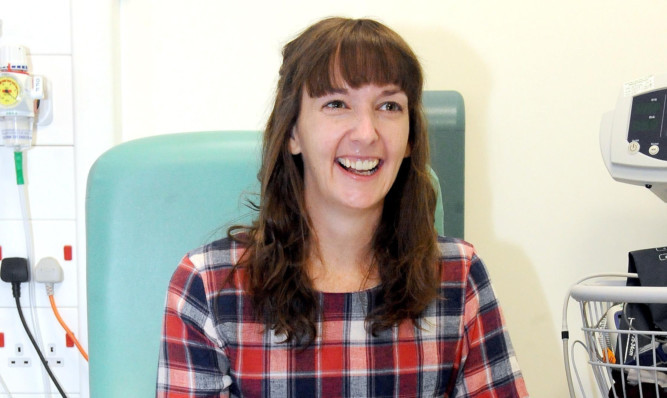A nurse who is being treated for a late complication of an Ebola infection has “made a significant improvement”, doctors have said.
Pauline Cafferkey, 39, was admitted to the isolation unit at the Royal Free Hospital in north west London earlier this month after becoming unwell in Glasgow.
Ms Cafferkey was previously described as being “critically ill” and fighting for her life, months after it was believed she had seen off the infection. Her condition was later updated as “serious but stable” as doctors battled to reduce the risk to life.
Infectious diseases consultant at the Royal Free Hospital Dr Michael Jacobs said Ms Cafferkey became unwell with meningitis caused by Ebola.
He said staff were pleased with their patient’s progress but said she would remain in hospital for some time.
Speaking at a press conference at the hospital, Dr Jacobs said: “I’m very pleased today to have the opportunity to update you about Pauline’s conditionand explain a little about her current illness.
“The last few days she has made a significant improvement.
“She is inside the isolation unit … But she’s talking freely with the staff, using the iPad, beginning to eat a little.
“I think she has a long recovery ahead of her and will be with us for quite a while still.”
He described the situation as “unprecedented” and said it was a “completely different” type of Ebola than had been seen by medical staff previously.
Ms Cafferkey was flown from Glasgow in a military aircraft in the early hours of October 9.
She had become unwell earlier in the week and was treated at the Queen Elizabeth University Hospital in Glasgow before being transferred.
The nurse was treated for Ebola in the Hampstead hospital’s high level isolation unit.
Ms Cafferkey has been treated with an anti-viral drug in the early stages ofdevelopment called GS5734, Dr Jacobs said.
“This is a highly experimental treatment,” he said. “We don’t know if it’s of benefit to her.”
He added: “The crucial treatment is the exceptional nursing care at the Royal Free Hospital, that’s what has really made the difference here.
“It’s really important to understand we don’t use the term critically ill lightly.
“It means someone is at imminent risk of dying.
“We were extremely concerned about Pauline’s condition.
“That’s why we’re thrilled to be having this conversation now.”
Ms Cafferkey first contracted Ebola while working as a nurse at the Save the Children treatment centre in Kerry Town, Sierra Leone.
A report from the charity in February said she was probably infected as a result of using a visor to protect her face rather than goggles.
It said she was unable to use the standard protective goggles because she could not get them to fit properly.
Ms Cafferkey, who is from South Lanarkshire, was diagnosed with Ebola in December after returning to Glasgow from the west African country via London.
She spent almost a month in an isolation unit at the Royal Free before being discharged in late January.
Scientists agree that bodily tissues can harbour the Ebola infection months after the person appears to have fully recovered.
Ms Cafferkey’s family have previously claimed doctors “missed a big opportunity” to spot she had fallen ill with Ebola again.
A total of 58 close contacts of the nurse have been identified, with 40 of those offered vaccinations as a precaution.
